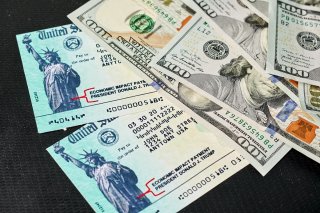Stop Asking for Another Stimulus Check. Like. Right. Now.
The debate over a fourth stimulus check continues to rage on Capitol Hill. But it has ended almost everywhere else.
The debate over a fourth stimulus check continues to rage on Capitol Hill. But it has ended almost everywhere else.
So far, Americans making under $75,000 per year have received three stimulus payments since the onset of the pandemic. The first, provided by the Coronavirus Aid Relief and Economic Security (CARES) Act in March 2020, sent out immediate $1200 checks. Fights over a second stimulus check continued through the fall; while many Democrats initially wanted a $2000 measure, the compromise was a $600 check, which was ultimately mailed out in December. Once President Biden entered office in January, work began on a third check, which was ultimately sent out – totaling $1400, the missing amount from the earlier measure – in mid-March.
It has now been more than three months since the beginning of the third round of checks. So far, 167 million payments have been sent out, totaling roughly $395 billion in direct aid for U.S. citizens. Last week alone, another 1.8 million payments were sent out, and the number is likely to increase as the IRS processes its May tax returns and updates its mailing information for more taxpayers.
Surveys indicate that many Americans want another check – and there is evidence to suggest that many of them could use one. A survey conducted by financial services firm TransUnion determined that nearly 40 percent of Americans were still being paid less than they were at the beginning of the pandemic. Other surveys have suggested that between 65 and 90 percent of Americans viewed the checks as helpful to them, and would appreciate another.
Taking a cue from popular support, more than 80 Congressional Democrats have supported various proposals for a fourth stimulus proposal – the most notable being a $2000 monthly payment until the pandemic is declared to have ended. While Biden has conspicuously avoided committing to a fourth stimulus proposal, he has also not refused outright, and the hope that he will come around to the idea has fueled a number of letters to the White House from lawmakers intent on such a measure.
At the same time, however, there are signs that a fourth stimulus check might not be needed. Despite slow progress in April, the economy seems to be recovering on its own, aided by a massive vaccination campaign which has so far given at least one shot to more than half of all Americans. When Brian Moynihan, CEO of Bank of America, appeared before Congress in May, he argued that roughly two-thirds of Americans had not spent the money they gained from the stimulus measure – suggesting the dire need for extra cash has passed.
And while President Biden has remained lukewarm on the idea of a fourth stimulus measure, he has provided generous assistance in other ways – for instance, continuing to pay federal unemployment benefits of up to $300 per week to those who need them, even after local opposition.
Trevor Filseth is a current and foreign affairs writer at the National Interest.

